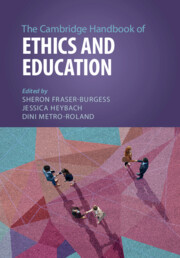Book contents
- The Cambridge Handbook of Ethics and Education
- The Cambridge Handbook of Ethics and Education
- Copyright page
- Epigraph
- Contents
- Figures
- Tables
- Contributors
- Foreword
- Preface
- Acknowledgments
- Part I Traditions in Ethics and Education
- Part II Ethics and Education in Practice
- 15 Why Educate?
- 16 The Displacement of Ethics in Education through Educational Standardization
- 17 School Health Policies and Practices
- 18 Value Creation and Happiness in Education
- 19 Children’s Rights, Childhood, and the Sovereignty of the Good
- 20 School Discipline and the Ethics of Punishment
- 21 Educating All Children
- 22 Decolonizing Curricula
- 23 The Political Necessity and Perilous Ambiguity of “Academic Freedom”
- 24 Teacher Activism and Ethical Speech
- 25 The Specter of Agreement
- 26 Philosophical Reflections on Ethics in Teaching and Teacher Education
- 27 The Ethical Dimension of Educating Educators
- Part III Emerging Ethical Pathways and Frameworks
- Index
- References
23 - The Political Necessity and Perilous Ambiguity of “Academic Freedom”
from Part II - Ethics and Education in Practice
Published online by Cambridge University Press: 07 March 2024
- The Cambridge Handbook of Ethics and Education
- The Cambridge Handbook of Ethics and Education
- Copyright page
- Epigraph
- Contents
- Figures
- Tables
- Contributors
- Foreword
- Preface
- Acknowledgments
- Part I Traditions in Ethics and Education
- Part II Ethics and Education in Practice
- 15 Why Educate?
- 16 The Displacement of Ethics in Education through Educational Standardization
- 17 School Health Policies and Practices
- 18 Value Creation and Happiness in Education
- 19 Children’s Rights, Childhood, and the Sovereignty of the Good
- 20 School Discipline and the Ethics of Punishment
- 21 Educating All Children
- 22 Decolonizing Curricula
- 23 The Political Necessity and Perilous Ambiguity of “Academic Freedom”
- 24 Teacher Activism and Ethical Speech
- 25 The Specter of Agreement
- 26 Philosophical Reflections on Ethics in Teaching and Teacher Education
- 27 The Ethical Dimension of Educating Educators
- Part III Emerging Ethical Pathways and Frameworks
- Index
- References
Summary
This chapter provides definitions of academic freedom and its legal precedents, stemming from the First Amendment. The authors note the tension placed on the concept as it occupies a space between the purposes of democratic legitimation and the promotion of democratic competence. The strain on conceptualizations of academic freedom is exacerbated by a lack of legal clarity and the ambiguity of some of its key elements. Contemporary challenges, including the neoliberalization of the university and political attacks in the form of “divisive concepts” bills, will continue to test the discursive power of “academic freedom.”
- Type
- Chapter
- Information
- The Cambridge Handbook of Ethics and Education , pp. 485 - 508Publisher: Cambridge University PressPrint publication year: 2024

